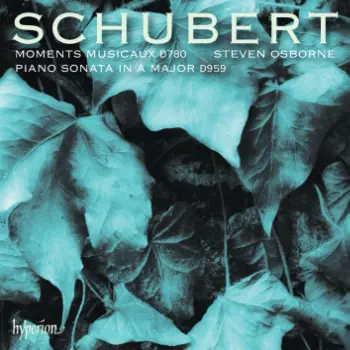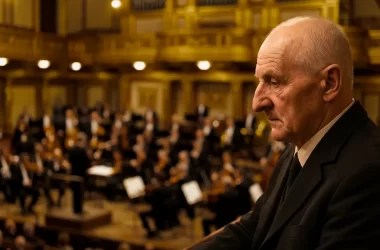This is the third Schubert recording Steven Osborne is making for Hyperion. The first included works for four hands with Paul Lewis, and the second had shorter solo works – Impromptus D. 935 and D. 946. On this new release, Osborne opens with a large piece, the Piano Sonata in A Major (D. 959), followed by the Moments Musicaux, D. 780.

Osborne tends to excel in Schubert’s more introspective passages, highlighting nuances often overlooked in more extroverted performances. The opening movement of the sonata is an example of Osborne’s careful balance between strength and subtlety. While his playing doesn’t match Mitsuko Uchida’s imposing chordal impact, it offers refined clarity, especially noticeable in the delicate arpeggios and pristine runs. The lyrical E major second theme is particularly well-handled, displaying warmth and calm, reflective of Osborne’s best qualities as a Schubert interpreter.
The slow movement further accentuates Osborne’s strengths, as he navigates the sparse textures with impressive emotional sensitivity. Interestingly, he treats the 3/8 instruction in pairs, which make the musical phrases sound more sustained. This ability to sustain tension and expressivity in this bare musical landscape is commendable, emphasizing melodic beauty without overstatement. The stormy middle section, however, is not as haunted as other performances. Turn to Paul Lewis, and you’d hear everything coming to near-collapse. Osborne is more cautious not to let things get out of control.
In the Scherzo, Osborne effectively captures the music’s playful character. Even the ‘rude’, loud interjections have a sense of humor, though this liveliness does not fully carry through to the finale. In the concluding Rondo, Osborne’s performance remains restrained, prioritizing lyrical smoothness over dramatic contrast. Unlike Schiff or Kovacevich, who build toward moments of great dramatic impact, tirelessly trying to return to the safe heaven of the main theme, Osborne opts for a gentler approach, leaving some of the music’s potential excitement unexplored.
A similar approach prevails over the Moments Musicaux. The opening C major Moment (track 5) is elegantly presented, with Osborne’s legato technique creating a silky, refined tone. Still, one misses the greater contrast and emotional range offered by Alfred Brendel, who better highlights the shifts between major and minor tonalities and the nuanced interplay of light and dark.

Steven Osborne (image: ©️ Benjamin Ealovega)
Osborne’s interpretation of the second A-flat Moment moment (track 6) reveals his notable skill in voice-leading. He maintains impressive fluidity in the upper register amidst chordal textures, with sensitive phrasing that unifies the movement’s recurring motifs. The melancholic episodes stand out for their carefully controlled dynamics, resulting in one of the album’s most convincing interpretations.
Despite the brisk pace, neat articulation, and dance like character of the beloved F minor Moment (track 7), listeners familiar with Schiff’s versions might long for a more deliberate and varied delivery. The pianist’s precision in staccato rhythms and dotted figures is admirable in the dramatic fifth Moment (track 9), yet his sense of urgency and drama is less pronounced compared to the more compelling, bass-driven interpretation by Daniele Pollini (reviewed here).
Hyperion’s engineers offer clear and detailed sound quality, complementing Osborne’s careful attention to detail. While this recording might not become a top recommendation for these Schubert works, it remains a thoughtfully executed and enjoyable interpretation, especially valuable for listeners who appreciate the subtlety and introspective side of Schubert’s music.
Recommended Comparisons
Uchida | Schiff | Lewis | Brendel | Kovacevich
Top image: ©️ Benjamin Ealovega

Album Details |
|
|---|---|
| Album name | Schubert – Piano Sonata, D. 959, Moments Musicaux, D. 780 |
| Label | Hyperion |
| Catalogue No. | CDA68437 |
| Artists | Steven Osborne |



















